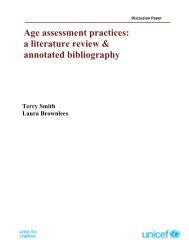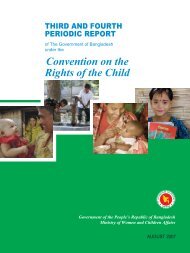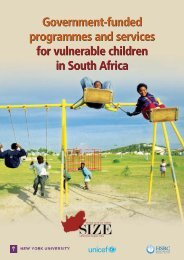Children's Vulnerability to Climate Change and Disaster ... - Unicef UK
Children's Vulnerability to Climate Change and Disaster ... - Unicef UK
Children's Vulnerability to Climate Change and Disaster ... - Unicef UK
You also want an ePaper? Increase the reach of your titles
YUMPU automatically turns print PDFs into web optimized ePapers that Google loves.
could help generate real-time information on<br />
climate change impacts <strong>and</strong> trends <strong>and</strong> serve<br />
as an early warning system on food security<br />
issues, disease outbreaks <strong>and</strong> children’s overall<br />
health. Some governments are already piloting<br />
such systems. In Indonesia, the National<br />
Institute of Health Research <strong>and</strong> Development,<br />
within the Ministry of Health, launched a<br />
three-year pilot project with the World Health<br />
Organization <strong>and</strong> the Center for Disease<br />
Control <strong>and</strong> Environmental Health <strong>to</strong> develop a<br />
sentinel surveillance system that analyses<br />
health, weather <strong>and</strong> environmental data in six<br />
districts (in six provinces). 110 A critical niche<br />
for UN agencies is <strong>to</strong> help governments access<br />
international experience, expertise <strong>and</strong> lessons<br />
learned on climate change adaptation <strong>and</strong><br />
disaster risk reduction.<br />
6.3 Mainstreaming children’s issues<br />
in<strong>to</strong> policy documents relating <strong>to</strong><br />
climate change<br />
The threat that climate change presents is not<br />
only one of greater exposure <strong>to</strong> hazardous<br />
events but also of changes in the incidence,<br />
range, intensity <strong>and</strong> seasonality of existing<br />
health disorders <strong>and</strong> diseases. Even how<br />
governments respond <strong>to</strong> climate change<br />
threats can exacerbate children’s overall risk,<br />
for example, by initiating relocation strategies<br />
without considering child protection issues.<br />
Policies that fail <strong>to</strong> distinguish children from<br />
adults can result in additional harm <strong>to</strong> children.<br />
A coordinated multisec<strong>to</strong>ral effort is needed <strong>to</strong><br />
address the range of impacts on children <strong>and</strong><br />
their families.<br />
A variety of ministries will need <strong>to</strong> be involved<br />
<strong>to</strong> ensure that children’s needs <strong>and</strong> priorities<br />
are addressed: the environmental ministry for<br />
identifying environmental vulnerabilities; the<br />
meteorology department for tracking weather<br />
vicissitudes; the education ministry for<br />
ensuring quality education <strong>and</strong> safe school<br />
environments <strong>and</strong> promoting feeding<br />
programmes; the health ministry for<br />
strengthening surveillance <strong>and</strong> early warning<br />
systems as well as the health care system in<br />
vulnerable areas; the finance ministry for<br />
ensuring adequate social expenditures <strong>and</strong><br />
allocating climate change-specific budgeting;<br />
the social welfare ministry for ensuring<br />
protective environments <strong>and</strong> targeting<br />
protection <strong>and</strong> social services support,<br />
particularly <strong>to</strong> vulnerable groups; <strong>and</strong> the<br />
planning <strong>and</strong> interior ministries for<br />
strengthening coordination across agencies<br />
involved in disaster management <strong>and</strong><br />
development planning. An effective<br />
coordinating mechanism is also needed.<br />
Some countries have created sec<strong>to</strong>r-based<br />
working groups that encompass line<br />
ministries, civil society, the private sec<strong>to</strong>r <strong>and</strong><br />
donors <strong>to</strong> coordinate priorities around climate<br />
change <strong>and</strong> disaster risk reduction. For<br />
example, Indonesia created a National Council<br />
on <strong>Climate</strong> <strong>Change</strong> in 2008 <strong>to</strong> develop climate<br />
change policies <strong>and</strong> coordinate climate change<br />
activities across relevant ministries. Similarly,<br />
in 2010, Thail<strong>and</strong> created a <strong>Climate</strong> <strong>Change</strong><br />
Coordinating Unit under the Office of the<br />
National Environment Board. Mongolia has<br />
established an inter-disciplinary <strong>and</strong> crosssec<strong>to</strong>ral<br />
national <strong>Climate</strong> Committee, led by<br />
the Minister for Nature, Environment <strong>and</strong><br />
Tourism, <strong>to</strong> coordinate <strong>and</strong> guide climate<br />
change activities <strong>and</strong> policy measures. Such<br />
groups offer entry points for making sure that<br />
child-centred data relating <strong>to</strong> climate change is<br />
adequately integrated within poverty reduction<br />
<strong>and</strong> sustainable development strategies <strong>and</strong><br />
health planning <strong>and</strong> that children’s needs <strong>and</strong><br />
rights are mainstreamed in<strong>to</strong> project designs.<br />
Several governments <strong>and</strong> international<br />
financial institutions have earmarked funds for<br />
climate change mitigation <strong>and</strong> adaptation<br />
activities. For example, Indonesia has<br />
developed a <strong>Climate</strong> <strong>Change</strong> Trust Fund that<br />
serves as a financing mechanism for<br />
implementing national climate change policies<br />
<strong>and</strong> programmes. Other funds include the<br />
Copenhagen Green <strong>Climate</strong> Fund, the World<br />
Bank <strong>Climate</strong> Investment Funds (including the<br />
Clean Technology Fund <strong>and</strong> Strategic <strong>Climate</strong><br />
Fund), the Global Environment Facility’s Least<br />
Developed Countries Fund <strong>and</strong> Special <strong>Climate</strong><br />
<strong>Change</strong> Fund, <strong>and</strong> the Adaptation Fund. 111 It is<br />
important that governments uphold their<br />
commitments under the Convention on the<br />
Rights of the Child by increasing investments<br />
that improve children’s adaptive capacities <strong>and</strong><br />
by safeguarding that related investments <strong>and</strong><br />
activities take children’s concerns in<strong>to</strong> account.<br />
110<br />
ibid.<br />
111<br />
See http://www.climatefund.info/climate_fund_info for more<br />
information on climate change-related funding mechanisms.<br />
20

















